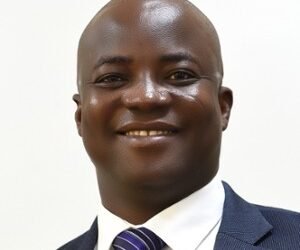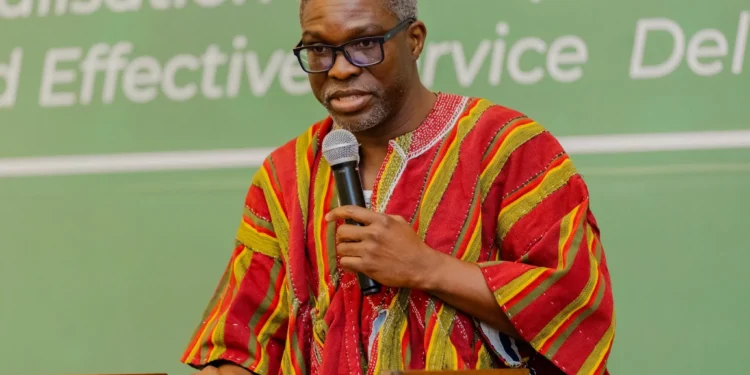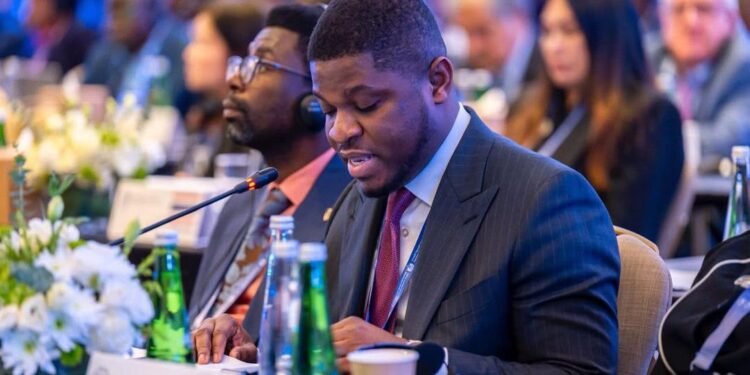The Ghana Catholic Bishops Conference (GCBC), led by its President, Most Rev. Matthew Gyamfi, Bishop of the Sunyani Diocese, has paid a courtesy call on President John Dramani Mahama at the Jubilee House, demanding urgent actions on some critical national issues.
The meeting, characterised by sober reflection and heartfelt appeals, offered a rare but profound occasion for the Catholic Church to present what it called a “sacred space for frank reflection and renewed resolve” to address Ghana’s most pressing challenges.
In his address, Most Rev. Gyamfi thanked President Mahama for graciously granting the audience, describing it as “timely and necessary” given the current national context.
“Mr President, the thirty-two years of our democratic dispensation in the fourth republic have been governed by sixteen years each. The Catholic church contributed to the struggle for freedom whenever necessary because of our conviction about the inviolability of the rights of our people.
“Sadly, however, the success has been shocking over the years, underwhelming.”
President, Most Rev. Matthew Gyamfi, Ghana Catholic Bishops Conference (GCBC)
In light of President Mahama’s return to office with a renewed and decisive mandate, the bishops believe that now is the time for “rare and meaningful change.”
They emphasised that failure to deliver, especially under such a strong electoral mandate, would find “very little sympathy from the citizenry.”
The Ghana Catholic Church’s contributions to the country’s educational development featured prominently in the dialogue.

Bishop Gyamfi lamented the erosion of Catholic educational infrastructure, especially at the basic level, where many schools are located in church facilities. “It is time,” he said, “to revisit and reinvigorate this partnership rooted not in nostalgia, but in shared responsibility and mutual respect.”
The GCBC proposed a church-state co-management framework grounded in principles of mutual accountability and subsidiarity.
Specific proposals included the creation of joint oversight committees at national, regional, and diocesan levels, greater autonomy in staff recruitment and disciplinary processes, and guarantees for implementing agreed-upon reforms between the Ghana Education Service, the Ministry of Education, and the Catholic Education Directorate.
Fighting Galamsey
Perhaps the most urgent appeal from the bishops concerned the destructive impact of illegal mining—commonly known as “galamsey.”
Calling the situation a “threat of national proportions,” Bishop Gyamfi cited alarming data that shows over 4,000 hectares of forest cover lost recently due to illegal mining.
He stressed that beyond ecological damage, galamsey was precipitating “social and moral disintegration,” driven largely by desperation and economic hardship.
In response, the GCBC laid out a bold suite of policy proposals aimed at stamping out the menace and restoring ecological and social balance.
The bishops proposed a repeal of permissive legislative instruments under the Minerals and Mining Act (Act 703 of 2006), a moratorium on new artisanal and small-scale mining licenses, and a declaration of a “targeted state of emergency” in galamsey-affected areas.

They urged the deployment of military engineering units for land reclamation, restoration of lawful local governance with decentralised oversight, and publicly available environmental impact audits.
They also called for the enforcement of reclamation bonds and increased collaboration between the state, the church, and traditional authorities.
To tackle the root economic causes, the GCBC suggested vocational training, agroforestry, aquaculture, and ecotourism development, funded through the Minerals Development Fund.
Additionally, the bishops urged the implementation of a national blockchain-based system for tracking mineral resources from source to export to curb smuggling and revenue loss.
“If we are able to salvage Ghana from galamsey,” Bishop Gyamfi asserted, “it probably might be the biggest legacy any government can leave.”
Growing Disillusionment
Turning to matters of democracy and regional stability, Bishop Gyamfi shared insights from a recent ECOWAS bishops’ meeting in Dakar, which highlighted a growing sense of disillusionment with democratic institutions across West Africa.
In Ghana, he warned, the downward trend in electoral participation—60.9% in the 2024 elections—is telling. Particularly concerning is the disengagement of the youth, many of whom now see politics as “transactional and exclusive.”
The bishops stressed that democracy must work not only at the ballot box but through inclusive policies and equitable governance.
National unity, according to the GCBC, is also fraying under the weight of intensified political polarisation, ethnic and regional mistrust, land disputes, chieftaincy conflicts, and the persistence of electoral violence. ‘

Despite Ghana’s impressive record of nine successful elections and peaceful transfers of power, Bishop Gyamfi decried that violence has continued to mar the democratic process.
The bishops cited figures from the Centre for Democratic Development (CDD-Ghana) showing 76 incidents of violence related to the 2024 elections—including six deaths and 46 injuries—as evidence of the urgent need for reform.
Governance Reforms
Against this backdrop, the bishops presented a suite of governance reforms for President Mahama’s consideration.
These included: linking public service remuneration to national equity, prioritising labour-absorbing infrastructure projects, expanding and depoliticising social welfare programs such as the Livelihood Empowerment Against Poverty (LEAP) and the National Health Insurance Scheme (NHIS), and passing campaign finance laws with independent auditing.
They also called for reforming security deployment during elections, reconstituting the Electoral Commission’s appointment structure to ensure its independence, and establishing a civil service charter to protect public servants from political interference.
In a unique gesture of long-term engagement, the GCBC also proposed the institutionalization of a biennial inter-party forum led by faith-based and traditional leaders to foster dialogue and consensus-building.
“As shepherds of souls, we do not seek to govern, but we are called to guide, to remind, and to raise our voice when the nation’s conscience trembles.”
President, Most Rev. Matthew Gyamfi, Ghana Catholic Bishops Conference (GCBC)
Concluding his address, Bishop Gyamfi made a passionate appeal for leadership that serves the most vulnerable.
“Mr. President, let us build a politics that serves not itself, but the flourishing of the weakest. A politics where governance is not only performance, but a moral vocation.”
President, Most Rev. Matthew Gyamfi, Ghana Catholic Bishops Conference (GCBC)
He prayed for wisdom, courage, and humility to do what is right for Ghana and urged President Mahama to institutionalise regular engagements with the Church, ensuring continued collaboration for the nation’s well-being.
Ghana stands at a pivotal juncture, and the nation’s moral, ecological, educational, and political health demands bold action and principled leadership.
With a strong democratic mandate and the nation’s hopes riding on him, President Mahama was urged to lead not only with competence but with conscience, and the bishops pledged their support should he choose that path.
READ ALSO: Trump Slams UK Windfall Tax, Urges North Sea Drilling























